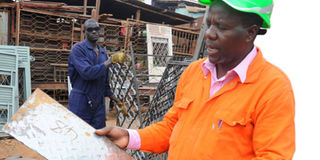Metal fabrication keeps Bikangaga going

At his workshop Bikangaga employs and trains youth to do metal fabrication. Photo by Racel Mabala
Wilson Bikangaga works his phones as he passes instructions to his workers at his workshop in Ntinda.
He is a soft spoken man who has risen from zero to tell the story of an entrepreneur who has been through thick and thin to reach where he is.
“I began my business in December 2000 after studying mechanical engineering from Uganda Polytechnic Kyambogo (now Kyambogo University),” Bikangaga says.
Before that he had worked with a few companies including Technology Systems, Schweppes, Coca-Cola.
However, he moved on to search for a better opportunities.
However, his search could not yield much, which gave him an idea to go into self-employment.
“I had failed to get a job. And I didn’t have any money to start a business,” he says.
However, as luck would have it, Bikangaga had friends who were already in the fabrication business to give him a hand.
“I started as a wielder and after a few months I had gained the trust of some people who would give me work and references from other people,” he says.
In 2001, Bikangaga sought hands-on training from Katwe, where he would spend at least a year training on a number of things such as metal curving, lining and painting, among others.
All this long, he says, he would survive through doing commission jobs and he would use the proceeds to pay for the training that was conducted by Martin Kasaga.
After a year, Bikangaga bought a grinder, a wielding machine and a hacksaw frame. These were the first signal of his way into entrepreneurship.
“These were my first ever machines. All along I had been using people’s [machines] but now that I had bought my own. It was time to do something of mine,” he says.
Today, Bikangaga continues to hustle in his own workshop and has since moved from Katwe to Ntinda near the market.
His workshop fabricates all sorts of metallic assortments that are curved out of mild steel, stainless steel and aluminum.
He also builds car bodies such as pickup extensions, manual cesspool emptier food processing machines and doors and window carvings. His works tell the story of a hardworking man, who rose from nothing.
However, this has not been without challenges as Bikangaga says, it is a tough job that comes with a lot of competition.
“It [metal fabrication] has countless opportunities but because everyone who has no job branches into metal fabrication it has brought a lot of competition and resulted into a drop in quality,” he says, highlighting that there are a lot of people who are producing low quality and fake products, which has caused a lot of challenges for the industry.
Beyond this, is the problem of high labour turnover, which makes the process of production high because he has to hire labour at various intervals of the production.
The business, he also says, is less profitable and it lacks critical government planning, which makes it a permanently subsistence sector.
“This business is not regulated. Actually we are known as Juwakili, which in essence means that we are unprofessional. This is unfair because it is unfair to call a person who has been doing a job for more than 12 years unprofessional,” he says. Additionally, Bikangaga says, the cost of power, high cost of inputs and high licensing and tax regimes have also been a problem.
Bikangaga employs about 10 people in addition to training youth in the area of metal fabrication, carving and wielding.
The trainees, he says, are certified through collaborations with Uganda Small Scale Industry Association, Nakawa Vocational Institute and the Directorate of Industrial Training.
“I have done a number of trainings including one in Germany. I use this knowledge to offer better training to youth so that they can produce quality products,” he says.
Appeal to government
According to Bikangaga, government must help metal fabricators gain better skills to benefit from large scale projects such as the Standard Gauge Railway, oil and gas and dams, among others.
“There are so many people here who can do fabrication and wielding but every time you hear government saying we have no capacity. Why can’t government give us those skills instead of bringing foreigners,” he says. Small and medium enterprises, he says, must be given support not only to provide employment but to build the country’s industrialisation potential.
Government, he says, must stop dreaming of large industries without supporting SMEs, which employ majority of Ugandans.
“In so doing government will expand the tax base and provide sustainable employment to Ugandans,” he says.
Bikangaga says the business makes sales in the excess of Shs500m per annum.



